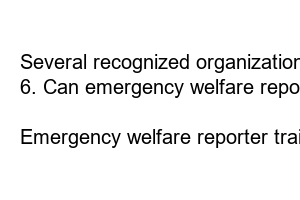긴급복지 신고의무자 교육
Title: Emergency Welfare Reporter Training: Developing the Skills to Make a Difference
Introduction:
In times of crisis, emergency welfare reporters play a crucial role in providing vital information, support, and assistance to those affected. The ability to effectively communicate and report on emergencies is essential in ensuring the well-being and safety of individuals and communities. With the proper training, anyone can learn the necessary skills to become an emergency welfare reporter and make a meaningful impact during times of need.
1. The Importance of Emergency Welfare Reporter Training:
Emergency welfare reporter training equips individuals with the knowledge and skills to effectively respond to and report on emergencies, ensuring timely and accurate information dissemination. By understanding the principles of emergency management, risk communication, and media ethics, reporters can contribute to minimizing panic, promoting safety measures, and coordinating relief efforts.
2. Developing Strong Communication Skills:
Effective reporting relies on strong communication skills. From concise and clear writing to active listening, emergency welfare reporters must be adept at collecting relevant information, synthesizing it, and conveying it in a manner that is easily understandable and accessible to diverse audiences. Additionally, reporters need to stay calm under pressure, empathize with individuals affected by the crisis, and present information with sensitivity.
3. Building a Solid Foundation in Emergency Management:
Emergency welfare reporters must have a solid grasp of emergency management principles to function effectively in rapidly evolving situations. Training programs cover topics like incident command systems, crisis response protocols, and understanding the roles and responsibilities of different stakeholders. This knowledge enables reporters to navigate emergency situations with confidence and contribute to organized response efforts.
4. Ethics and Professionalism in Reporting:
Emergency situations can be chaotic, and it is crucial for reporters to uphold ethical standards and maintain professionalism throughout their reporting. Emergency welfare reporter training emphasizes the importance of accuracy, balance, and fact-checking to avoid spreading misinformation. By developing a strong ethical framework, reporters can ensure their work contributes positively to mitigation and recovery efforts.
5. Utilizing Technology and Social Media:
In the digital age, social media and technology have become powerful tools for reporting and disseminating information during emergencies. Training programs equip reporters with the skills to effectively utilize these platforms while adhering to ethical guidelines. They learn techniques to verify information, engage with audiences, and leverage platforms for widespread reach, ultimately amplifying the impact of their reporting.
6. Collaboration and Coordination with Stakeholders:
In emergency situations, collaboration and coordination among different stakeholders are paramount. Emergency welfare reporter training emphasizes building strong relationships with emergency management agencies, humanitarian organizations, and community leaders. By fostering partnerships, reporters can gather timely and accurate information, access resources, and provide comprehensive coverage that benefits the affected communities.
FAQs:
1. Who can undergo emergency welfare reporter training?
Emergency welfare reporter training is open to individuals interested in reporting on emergencies, including journalists, communication professionals, volunteers, and aspiring reporters.
2. How long does emergency welfare reporter training typically last?
The duration of training programs varies, but they generally range from a few days to a few weeks, depending on the level of depth and expertise being offered.
3. Are there any prerequisites for attending emergency welfare reporter training?
There are usually no specific prerequisites for attending emergency welfare reporter training. However, a background or interest in journalism, communications, or emergency management can be advantageous.
4. Can emergency welfare reporter training be taken online?
Yes, many training programs offer online options to accommodate learners from all over the world. These online courses provide flexibility and accessibility.
5. Is emergency welfare reporter training recognized by industry professionals?
Several recognized organizations and institutions provide emergency welfare reporter training, ensuring that the knowledge and skills gained are valued and respected within the industry.
6. Can emergency welfare reporter training assist in career advancement?
Yes, obtaining training in emergency welfare reporting can greatly enhance career prospects within journalism, communications, and humanitarian sectors, as it demonstrates a specialized skill set and dedication to public service.
Summary:
Emergency welfare reporter training empowers individuals to become effective communicators and responders during times of crisis. By developing strong communication skills, understanding emergency management principles, adhering to ethics, utilizing technology, and fostering collaboration, reporters can make a significant difference in emergency situations. Whether aspiring to be a journalist or wanting to contribute to community welfare, undergoing this training equips individuals with the tools needed to report on emergencies with accuracy, compassion, and effectiveness.

